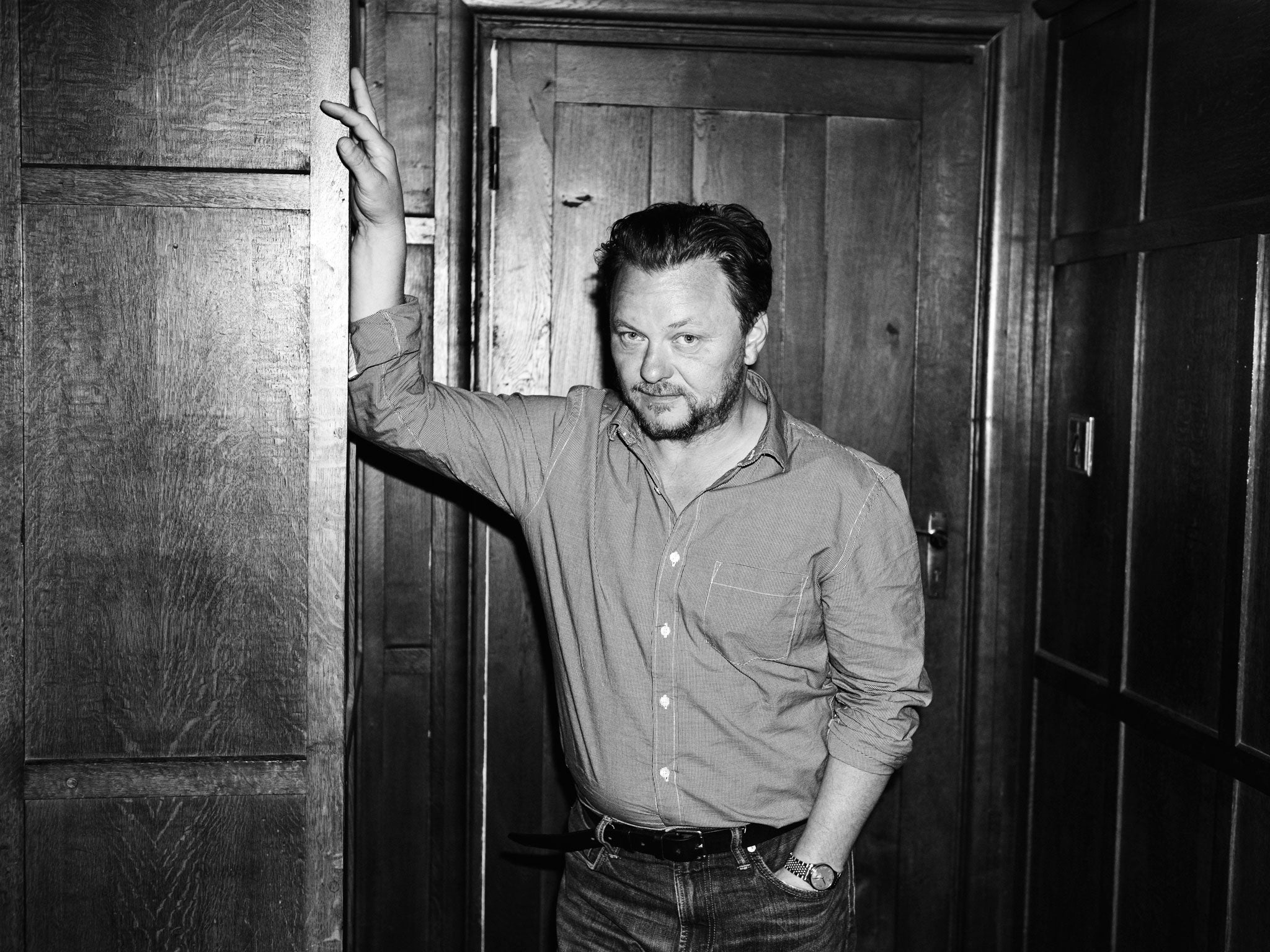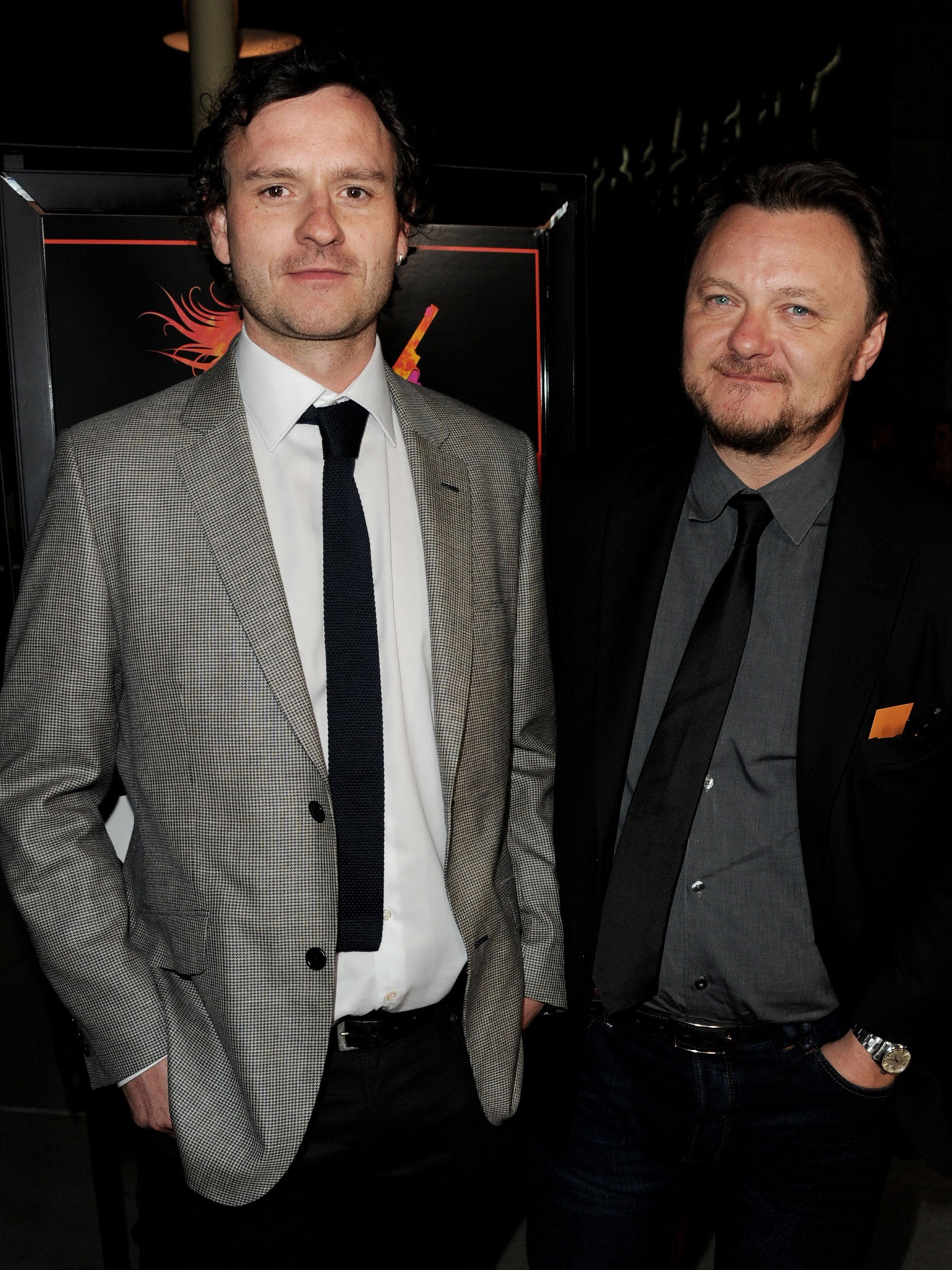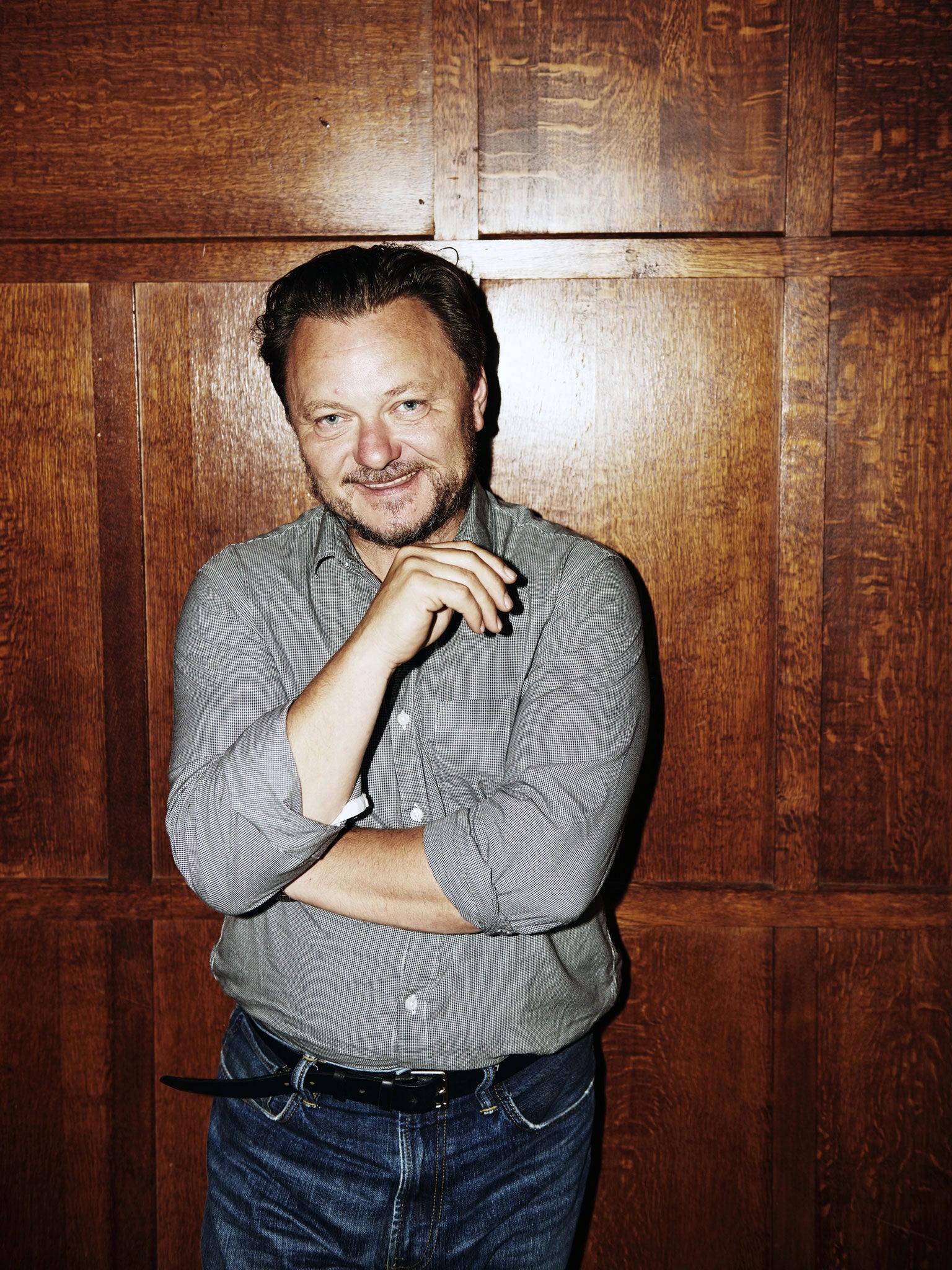John Niven interview: The wild man of fiction on sex, drugs ... and the upsides of middle age
The literary provocateur's incendiary first novel Kill Your Friends is getting the big-screen treatment

John Niven wants everything. Flashy sports cars, cigars, posh suits, fine wine, first-class travel, a manor house. So says the journalist Caitlin Moran – his friend, co-writer and Twitter sparring partner. "John is a man who looks at the world and goes: I'll take it. The whole lot. Don't bother wrapping it – I'll smoke it on the way out."
This explains a lot. It explains the enormous Porsche Cayenne that swings at speed into the High Wycombe station parking lot to collect me. It explains the well-appointed suburban red-brick villa we arrive at, the driveway, the neat lawn, the wood-panelled sitting room and the golf that is showing on the vast HD television. It certainly explains why, having collected a large pot of coffee from an orderly kitchen, we settle down outside on the patio so that he can chain-smoke some good old-fashioned wholemeal cigarettes.
I wasn't expecting Buckinghamshire for the wild man of literature, the author of Kill Your Friends – a shocking, foul-mouthed evisceration of the music business where he used to work – and Straight White Male, a bleak look into the contemporary male sexual psyche. I'd imagined we would meet in a groovy East End pub. I wasn't expecting a driveway and a lawn and wood panelling. I certainly wasn't expecting golf, or cufflinks.
As we sit down, Niven pours me a drink and then precisely arranges his phone, coffee and cigarettes just where he likes them. He is all impacted energy, fierce, talky intelligence and caustic wit. The 49-year-old, from a working-class background in Ayrshire and not untouched by tragedy, is somewhat battle-scarred in appearance. He has the air of someone holding it all together by great force of will; of a gritty determination to enjoy life come what may.
"I love being a writer," he says. "I have a great life. I get up in the morning and pad around in my dressing gown and listen to Radio 4." That's before he settles down to four or five hours of disciplined, lock-in work – no Twitter, no phone calls. "I've just written my seventh novel in 10 years. I was quite a late starter. I was 34 when I left the music business and I thought, 'I don't want to f**k around'.
"The only bad thing about writing is reading back first drafts. It's like watching footage of yourself masturbating. It's terrible. Writing is such a confidence trick. You're thinking, 'Who's going to give a s**t about this?' And also, you're aware of the footsteps you're treading in. You know – if you want to punch your weight. I once read Updike after writing a first draft and I wanted to put my own book on the fire. I've since learned to read utter crap while I'm writing: pulp is the thing.
"The first book I bought with my own money as a teenager was Martin Amis's Money." He sighs happily. "You know that thing when you read a book and you think: 'I'm going to have to read every word ever written by this man'."
Niven's bestselling breakthrough novel, Kill Your Friends, is clearly indebted to Amis in its unapologetic depiction of testosterone-fuelled venality. The novel is a fictionalised account of the years Niven spent working in the music business in the 1990s, when a hit record was a licence to print money and the record companies behaved as if it was the Wild West. A fast and furious satire of stomach-churning excess, it features a memorable and monstrous anti-hero – Steven Stelfox – who spends much of the book with his penis stuffed into the mouth of one hapless prostitute or another, before deciding that the best way to get the better of his business rivals is simply to kill them. Niven doesn't soft-soap the racism and sexism in the industry – and the book is bursting with energy and outrageous behaviour.
"I was a political indie kid in my teens," he says. "I'd never hang out with people who would scream sexist abuse at women out of a van – but I can see how Kill Your Friends might be misinterpreted as a celebration of sexist culture. But I don't think that's what the book does. I'd be scared of a world where you couldn't have sexist, racist and misogynist characters in novels. To put these people in novels doesn't mean that that's what the book is; I mean, Lolita isn't a paedophile's handbook."
I ask him whether he wanted to say something about men. "I think that comes dangerously close to asking, 'what is the novel about?' It's about itself for 330 pages is the answer to that. Beware the novelist with a political agenda or message. There are novels written from that wellspring, but not ones I enjoy. I didn't set out to write a corrective text: the worst of humanity are often very entertaining. And writing about it keeps us off the streets."

The book has just been made into a feature film, due for release in the autumn. Niven wrote the script.
Three more novels followed Kill Your Friends, before the arrival, in 2013, of the highly successful Straight White Male. The central character, Kennedy Marr, is, according to the blurb, a "borderline alcoholic and sex addict". (In my universe, he is in an advanced stage of both diseases – but that's a minor quibble which I will keep to this parenthesis.) At first, he rides high as a Hollywood "script doctor", but then tax problems mean he must return to Ireland to face up to a dying mother, an ex-wife, a neglected daughter and a suicidal junkie sibling.
Unlike Stelfox, Kennedy is eventually rehabilitated and he comes to feel a terrible emptiness and to see the destruction wrought in the name of pleasure. "It's somewhat autobiographical," Niven says. "Kennedy is conscious of his bad behaviour and," he adds a touch ruefully, "I always rather liked him.'"
Irvine Welsh, a friend of Niven's from the music business days, sees the novel as a cautionary tale: "This is what men are like at their worst. John is saying, "Fill your life with good things and women: don't sit in the pub and snort cocaine". A lot of working-class Scottish writers get into that self-flagellation thing. Not John. He takes the view that living well is the best revenge, and I can identify with that."
Niven came from a relatively humble background. His father was an electrician, his mother a cleaner, and he had a sister, and a younger brother – of whom more later. "I came from that kind of autodidactic west-coast tradition, I guess. My dad pushed me hard to do well in school. I was the first generation of my family to go to university; we probably wouldn't be able to afford it now. My parents didn't care what I went to study – as long as I went. I read English literature. My mum taught me to read at four; she was always in the library. But we never owned books."
After university, Niven played in a band and then quickly found a job as an A&R man, "out of laziness, really, and because I was sick of never having a bean. There was a lot of money in music before downloads spoiled the party. Those were the days when an album might sell three million copies at £13. There were just ridiculous amounts of money swilling around."
Welsh later tells me that Niven was famous for being a bigger party-head than the bands themselves: "It was a last-days-of-Rome kind of thing."
"I was in my late twenties," Niven says, "with a decent salary, a company car, guest lists, flying round the world... But I should have left five years before I did. Like a relationship, you persist until it can no longer be borne. There comes a point where drug use goes from being sociable to being a thing you do on your own – grams and grams in a flat on your own at five in the morning, grinding your gears. There are a lot of people from the Nineties who never really found a second act to their lives.
"I ended up burning all the bridges I had to burn in the music-biz world – maybe deliberately."

He'd considered trying to write in his spare time, but realised that it wasn't going to happen – and so he left his job with enough money to last a year, moved to the outskirts of London with his then wife, and faced up to the blank page. "Moving out here meant I was able to be up in good shape at eight or nine in the morning. I found I just couldn't write with the hangover self-loathing thing."
Niven's third book was called The Amateurs and was published in 2009. It features two brothers: one solid and dependable, the other troubled, unreliable, debt-ridden and involved with small-time gangsters. In the book, the troubled brother – also a keen amateur golfer – is hit on the head with a golf ball and sent into a coma. The family stands vigil by his bedside. The mother's need for him to live weighs "more than her own soul". She weeps and begs for him to pull through. He does – although his brain injury leads to comical side-effects.
In the late summer of 2010, a year after the book came out, Niven found himself ghoulishly re-enacting this exact scene with Gary, his real-life younger brother. Gary had been troubled since his teenage years in similar ways to his fictional Amateurs counterpart – and he was now in a coma for real, having hanged himself in a room just yards from the nurses' station in the Ayrshire A&E department.
Niven shrugs. "He obviously felt he could not get through another day," he points out somewhat curtly, going on to refer me to a newspaper article he wrote about the experience in 2013. "Everything I've got to say on the subject I put in that article."
In it he writes: "I watched my mother crying and begging for [my brother] to live. I listened to a doctor telling me about my brother's score on the Glasgow Coma Scale (three – bad) and watched the staff doing the things for Gary that I'd researched [for Amateurs]. The scene was so much like how I'd imagined it on the page – how I'd seen it in my mind's eye three years before – that I felt like laughing at the ludicrous neatness of life imitating art. My brother stayed like this for three days until he died, at 4pm on 3 September 2010."
Niven was left with grief, regret and guilt. Before his suicide, his brother would sometimes ring and ask him for money, saying that he was in danger of being shot by the low life crooks he hung out with. Sometimes Niven would lend him large amounts, sometimes – understandably – he wouldn't.
After his brother's death, he went to his house and found a pile of unpaid bills that amounted to a low five-figure sum; a sum that Niven could have cleared with one cheque. He wrote of this: "I remember leaning against the wall and sliding down it and bursting into tears and saying, 'Oh Gary, you stupid bastard. You stupid, stupid bastard.' I was remembering saying to him, 'What do you want it for this time?' And saying, 'For God's sake.' And saying, 'You still owe me £2,000.'"
I ask him what he thinks about the fact that the male suicide rate for middle-aged men is much higher than it is for women. "Well I suppose," he says, somewhat reluctantly, "most women have children at that age. Suicide is a luxury you can forget about if you've got kids. Women get on with that thing of having to cope and raise children – but there are a lot of guys for whom life hasn't turned out how they thought it might; who didn't become what they wanted to be. Men indulge themselves in those sorts of feelings in middle age – regrets and so forth."
He says that he is, himself, a hail-fellow-well-met kind of man, but admits that he thinks about death more frequently these days. "In your teens and twenties, death doesn't exist. In your thirties you glance down the road occasionally. But then in your forties it becomes a full-time job looking the other way. But there are definite upsides to middle age. You don't give a shit what people think of you. That's quite nice. You don't have to buy particular clothes, or stay out until three in the morning. You don't have to sit up until dawn trying to get laid."
If one good thing came out of his brother's death, it was that it led Niven to "attack the towers of blank pages" with even more energy. Moran is working with him on the screenplay of her novel How to Build a Girl and says his work ethic is ferocious. "He's like, 'Right, we get our heads down, we do this in a WEEK, tops!' He tears into things like a raptor. In a creative world that's often so milky and soft-hand-shakey, he's like one of those medieval battering rams, shouting out jokes as he smashes the castle walls down."
For his latest book, Niven has turned his coruscating gaze upon women; late middle-aged women. The Sunshine Cruise Company is a Thelma & Louise-style romp that puts three women in their sixties on the run from the police in Europe. Niven had been nursing the idea for a while. His mother, he says, is a youthful pensioner who is still teaching aerobics. "When you think about it, the 60-year-olds of today were the ones who were into punk rock back in the day. Growing old isn't what it used to be. I wanted to write something for older women to behave badly in."
The story begins with the lead character's husband being discovered dead in a suburban sex dungeon. He is impaled: "The dildo was a specialist custom-made job. He called it The Rectifier. It was matt black, close to two feet long with a girth of just over six inches: basically four coke cans stacked on top of each other."

When I ask Niven whether he thinks a lot of men living lives of quiet desperation are likely to meet their end in this way, he says: "Some people do very well out of novels crafted from the utterly commonplace, but I quite like a plot kicker myself – call me old-fashioned."
And so the book is fast and furious and, characteristically, brutal in places. It features 87-year-old Ethel Merriman in an electric wheelchair with a "grabbing stick". She is 20 stone, has lipstick on her teeth and a bumper sticker that reads: "I BRAKE FOR NO ONE". Her first line is: "Oh aye – shat the bed is it?" The three women rob a bank and make a run for it. "I didn't want it to be cutesy," Niven says. "I wanted it to be shocking – gritty. It's really no different to what the likes of Tom Sharpe was writing 30 years ago. Black farce."
He denies being a misanthrope and laughs at the suggestion. "As a novelist, you have to be an innocent: misanthropes and cynics don't really sit down to create, do they? Maybe they're the critics. A novel can be misanthropic, the characters can be. It doesn't mean the author is."
I have another go. Why does he enjoy writing misanthropic characters? He smiles and notices himself scratching his ear. "A tell!" he mutters gleefully. Then: "Happiness writes white." "What?" I say. "You know," he says. "Happiness doesn't show up on the page. There's nothing to say about it."
At this point, he suggests we clear the coffee cups and head back into the house to find the photographer. We step through the French windows and suddenly he's roaring "Go on you old whore!" into my ear. It takes me a moment to realise that the golf is still on the TV in the background – and he is only urging a small white ball across the green.
For all his denials that the life of his mind imitates the life of his art, one can't help wondering. The misogyny in his books is so lovingly drawn, so beautifully and convincingly observed. At one point, Kennedy gets a pleasing eyeful of cleavage: "Brown, freckled, the breasts firm, contained in a tightly cupping navy bra, as yet untroubled by gravity." It's that "as yet untroubled by gravity" that worries me. The character can't even admire a "decent rack", as he would call it, without pointing out that it will soon be devalued by this self-same male gaze.
There's something undeniably old fashioned about John Niven. He's Mad Men-esque, says Moran, which is a nice way of describing it. But if Niven was really bringing the sensibilities of Amis and Roth into our era of vulnerable men, that would surely look more like Peep Show or a Judd Apatow movie. Perhaps Niven is in denial. "Denial," he says, "is much maligned. Denial will get you through."
'The Sunshine Cruise Company' by John Niven is published by William Heineman on 13August. 'Kill Your Friends' will be in cinemas later this year
Join our commenting forum
Join thought-provoking conversations, follow other Independent readers and see their replies
Comments